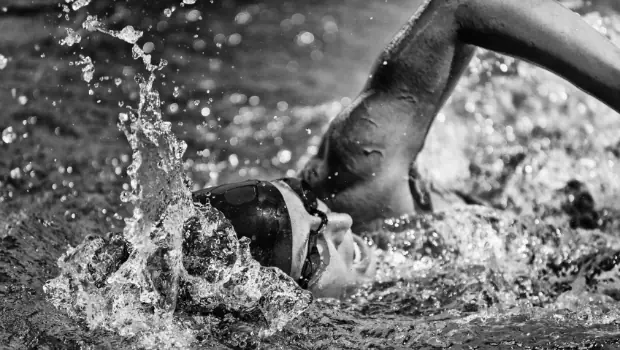
If you're an athlete who doesn't get the chance to swim in salt water often, the thought could be daunting. At California 70.3 the water is dark and chilly, you get no warm-up and there's a good chance you'll see a sea lion close by. In Kona, the water is clear blue and beautiful, but you don't get to wear a wetsuit--which for some is a brain bender. Here are eight tips to help navigate all the wonders salty swimming has to offer.
More: Treadmill Workouts for the Traveling Triathlete
1. Take a disposable bottle of water with you to drink in the morning and to rinse your mouth out with after you warm up. Hand it to a volunteer or spectator when you're done to prevent littering.
2. Shorten up your strokes if it's choppy. Practice this in the pool a few times leading up to the race.
3. Sight "higher" if there are waves. It's much harder to keep your head low on a choppy swim. Again, work on this in the pool before you head to the race.
4. You may need to roll more to breath. Pool technique rules don't apply all that well to a rough open water swim.
5. When approaching, T1 swim until your hands touch the sand coming back. That way you won't stand up too soon. Swimming is faster than walking through hip-deep water.
More: 7 Equipment Choices That Guarantee A Faster Bike Split
6. Have a water bottle at your bike to rinse your mouth out before you mount if the race doesn't have a place to rinse as you exit the water.
7. If the salt water gives you an upset tummy, consider putting two cinnamon chicklets in the corners of your mouth. Suck on them when you need to. It works great to rid your taste buds of that very strong sea water flavor that can lead to vomiting if you get too much of it.
8. Use Body Glide anywhere that clothing touches you. The salt water is like sand paper.
Some of these tips apply to lake swims as well. Hopefully one or two help you be your best on your next start line. Happy training and racing!
Angie Anderson is an ITU Level II Certified Coach, USA Triathlon Level I Certified Coach and has a bachelor's of physical education. Angie has worked with junior elites on a national level and now focuses solely on coaching age-group athletes. Angie enjoys the challenge of balancing coaching, training, racing and family. You can contact Angie at teamtrilife.com.

